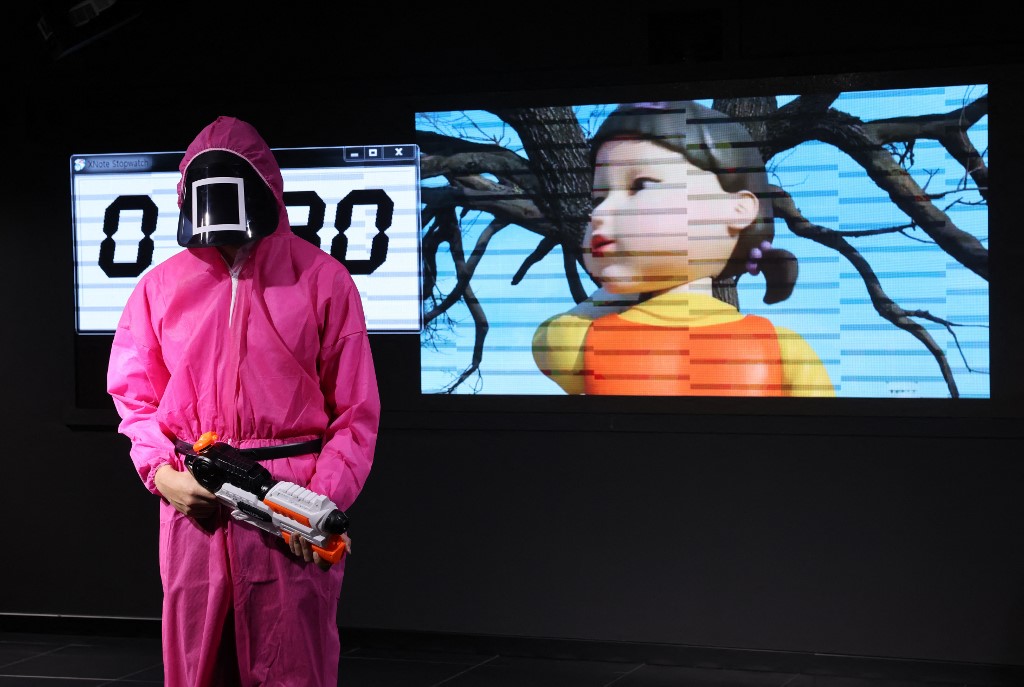Squid Game: A capitalist nightmare of all against all

WARNING: CONTAINS SPOILERS
Netflix’s Squid Game has become a phenomenon. In a market dominated by Euro-American productions, the South Korean series has become the globally most-watched show on Netflix. It has also been dubbed the most disturbing.
Critics have jumped to state the obvious: that the show, wherein contestants enter a tooth-and-claw competition, in the form of a series of children’s games that will result in death or in winning a cash prize (the sum of which increases as the number of contestants “eliminated” increases), is a convenient metaphor for competition under capitalism.
Whereas the contestants who risk their lives come from the downtrodden, global capitalist exploitation is satirised via a clique of wealthy 'VIPs' who pay to watch the games
The show is rife with references and allusions to the harsh socio-economic realities of modern South Korea, analogising the destitution and social stagnation suffered by its characters with the country's class struggle.
The series also nods towards the plight of migrant labour and the dovetailing of capitalism with racism. It does this by showing the brown immigrant, via the character of the Pakistani migrant worker Ali Abdul, as the ultimate victim of this system, doubly betrayed by his boss and by his relatively privileged Korean peers.
Stay informed with MEE's newsletters
Sign up to get the latest alerts, insights and analysis, starting with Turkey Unpacked
Whereas the contestants who risk their lives come from the downtrodden, global capitalist exploitation is satirised through a clique of (predominantly though not exclusively white Euro-American) wealthy “VIPs”, who pay to watch the games and bet on the players.
Game theory
A reading of the show as an allegory of capitalism would be consistent with the director’s own commentary on his work. But, given that there is no shortage of shows that gamify capitalist conditions of to-the-death competition over scarce resources in dystopian settings, this does not satisfactorily explain what has made this Netflix show so hugely popular and disturbing. What sets Squid Game apart is how it makes this dystopia relatable.
“I wanted to write a story that was an allegory or fable about modern capitalist society,” the show’s director Hwang Dong-hyuk said in an interview with Variety. “Something that depicts an extreme competition, somewhat like the extreme competition of life. But I wanted it to use the kind of characters we’ve all met in real life… The games portrayed are extremely simple and easy to understand.”
The games the contestants play turn the complexities of our dysfunctional reality into gaming models through which our behaviour as “players” can be observed. In other words, they perform what game theory has sought to achieve.
The prize that increases as the players are eliminated turns the games into a zero-sum game. Although the players are never told that there must be only one winner, the games encourage every player to view the elimination of others as personal gain. The zero-sum game we see on the screen fascinates and disturbs, not only because of the ruthless and gruesome behaviour it drives, but more importantly because the rationale behind it is highly logical.
Cinematic exaggeration and artistic licence aside, this self-centred rationale that calculates gain at the expense of others is a familiar characteristic of international politics, the corporate rat race, school grading systems and, evidently, children’s games.
'Leviathan'
As the contestants withdraw from the competition of the outside capitalist world to a purer form of win-all or lose-all battle, they experience many aspects of the "war of every man against every man", as theorised by the 17th-century English philosopher Thomas Hobbes in his work Leviathan.
Much like in Hobbes’s theory of nature, in Squid Game the removal of restrictions on competition renders everyone equal: the strong might be able to subdue the weak, but the weak can make up for their physical limitations through wit and stratagem, or through alliances (doomed by the rules of war to remain contingent and unstable) to defeat the strong.
Throughout the programme, we see alliances form and break, showing the characters’ ability for both compassion and backstabbing.
This is especially the case with the episode ironically titled “A Fair World”, wherein the characters engage in an all-out war of all against all; the only fair world possible under capitalism being a world in which people have an equal chance to harm one another as they compete.
This precarious equality, which the game-runners insist on maintaining at all times - to the extent of summarily executing the guards and players who try to manipulate the competition - does not lead to a fairer society, but the perpetuation of warfare until the last man is standing.
This aspect of Squid Game makes it yet more disturbing: when the characters, willingly, withdraw from real capitalist competition to a freer form of competition on a level playing field, maximalist forms of violence, treachery and brutality are unleashed.
Children's games
Perhaps the most unsettling aspect of Squid Game is that it shows us something we know about ourselves but strive to deny: that under conditions of free competition, we are capable of the very worst actions, even at the expense of people whom we may otherwise pity or love.
It is reminiscent of the "uncanny" suggested in Sigmund Freud's 1919 essay of the same name: something that is familiar coming back to us devoid of its familiarity, representing to us something we knew all along but tried to repress.
There is something uncanny about the programme's use of children’s games, which would normally invoke comfort and nostalgia, coming back in the form of deadly metaphors for a merciless global system
There is also something uncanny about the programme's use of children’s games, which would normally evoke comfort and nostalgia, coming back in the form of deadly metaphors for a merciless global system. This is exemplified in the game featuring a giant doll, singing an innocent tune, eliminating the losers.
It shows how the doctrine of competitiveness over cooperation, the notion that one must progress at the expense of others, including loved ones, has been ritualised through children’s games and thus has been ingrained in all of our psyches since our early years. Even group games take competitive forms against other teams; there are very few examples of children’s games that reward cooperation for its own sake, and not simply as a "competitive advantage".
As Squid Game shows us, unleashing Hobbesian, unregulated capitalism in its purest form has the terrifying potential to awaken in all of us what capitalism, through the ideology and rituals of competitiveness, has conditioned us for; that life is an all-out war of all against all - a struggle to the death, of every individual against every individual.
The views expressed in this article belong to the author and do not necessarily reflect the editorial policy of Middle East Eye.
This article is available in French on Middle East Eye French edition.
Middle East Eye delivers independent and unrivalled coverage and analysis of the Middle East, North Africa and beyond. To learn more about republishing this content and the associated fees, please fill out this form. More about MEE can be found here.







